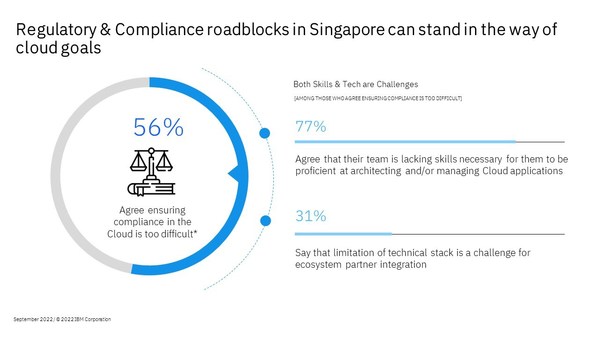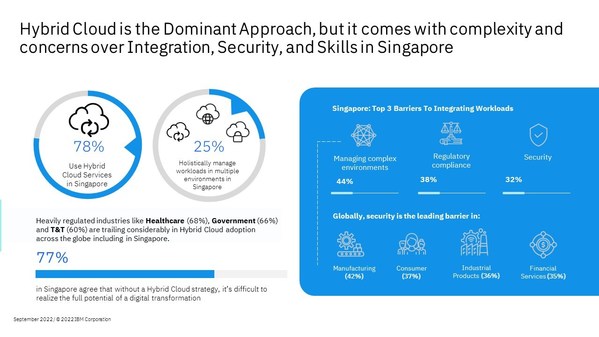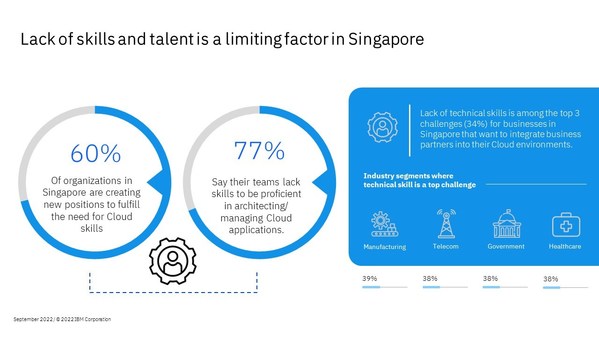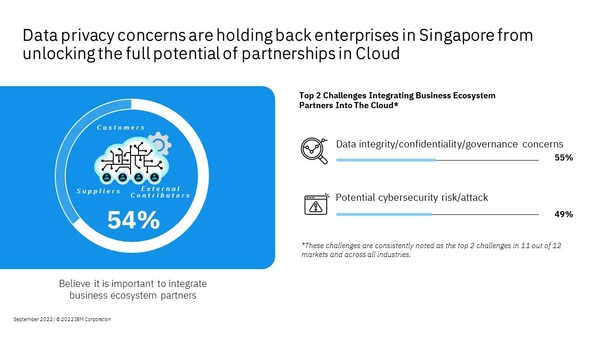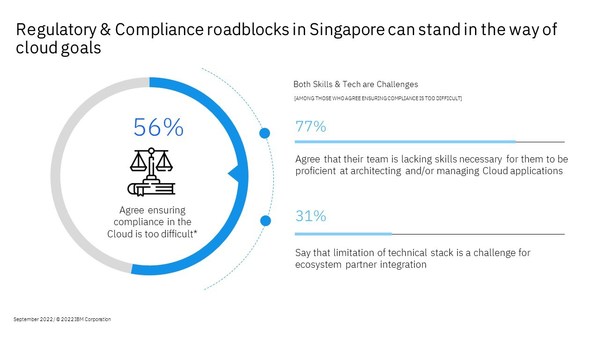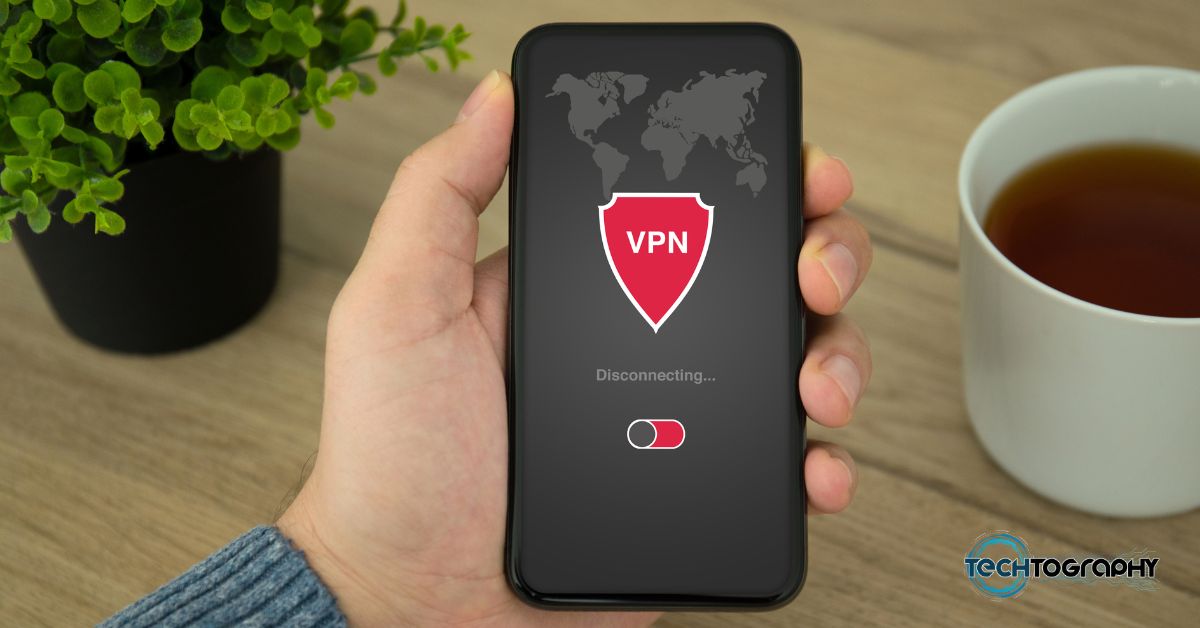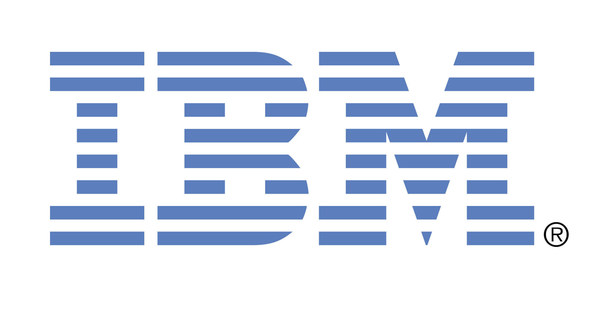 |
— New IBM Transformation Index: the State of Cloud helps business leaders to assess gaps in their transformation journey
— More than half of respondents are currently concerned about security, while 53% believe ensuring compliance in the cloud is currently too difficult
— Nearly 70% surveyed say their team lacks the skills needed to sufficiently manage cloud environments
SINGAPORE, Sept. 30, 2022 /PRNewswire/ — New global market research from IBM (NYSE: IBM) revealed that more than 77% of respondents have adopted a hybrid cloud approach which can help drive digital transformation, yet the majority of responding organizations are struggling with the complexity to make all their cloud environments work together. As organizations face skills gaps, security challenges, and compliance obstacles, less than one-quarter of respondents across the globe manage their hybrid cloud environments holistically – which can create blind spots and put data at risk.
The IBM Transformation Index: State of Cloud commissioned by IBM and conducted by independent research firm, The Harris Poll, was created to help organizations map their cloud transformation and empower them to self-classify their progress. Built on a foundation that leverages insights from experienced cloud professionals, enterprises can use the Index to gain measurable metrics that can help quantify their progress and uncover areas of opportunity and growth. The Index consisted of more than 3,000 business and technology decision-makers from 12 countries and across 15 industries including financial services, manufacturing, government, telecommunications and healthcare, to understand where organizations are advancing, or merely emerging, on their transformation journeys.
The Index points to a strong correlation between hybrid cloud adoption and progress in digital transformation. In fact, 71% of those surveyed think it’s difficult to realize the full potential of a digital transformation without having a solid hybrid cloud strategy in place. At the same time, only 27% of those surveyed possess the necessary characteristics to be considered as "advanced" in their transformation. So, why the disconnect? A sampling of findings include:
- Compliance: Businesses believe ensuring compliance in the cloud is currently too difficult – especially as we see enforcement of regulatory and compliance requirements heat up across the globe.
- Security: While businesses have embraced a variety of security techniques to secure workloads in the cloud, concerns about security still remain.
- Skills: As organizations face the realities of a talent shortage, they are failing to implement a holistic hybrid cloud strategy – which can create gaps in security and compliance and cause risk across cloud environments.
"As we see regulatory requirements grow across the globe, compliance is top of mind for business leaders. This concern is even greater for those in highly regulated industries. Yet at the same time, they are facing a growing threat landscape – one that demands holistic management of their multicloud environments to avoid the risks of a Frankencloud – an environment that’s so disconnected, it’s difficult to navigate and can be nearly impossible to secure, particularly against third and fourth party risks," said Howard Boville, Head of IBM Cloud Platform. "An integration strategy to bring together these different piece parts is what we believe separates the leaders from the rest of the pack – the alternative is to pay the price of the Frankencloud."
"The key value of cloud for businesses is rapid access to innovative technologies, data sources, and applications required to navigate current disruptions and transform businesses. No individual cloud can address all of an enterprise’s requirements, so they must be able to use and effectively control hybrid cloud assets across many locations. IBM with its focus on providing a holistic hybrid cloud strategy is well positioned to help organizations address the security, data management and compliance complexities that can prevent them from taking full advantage of cloud innovation,"?says Rick Villars, Group Vice President of Worldwide Research at IDC.
The 2022 IBM Transformation Index: State of Cloud revealed:
Lack of the right skills is inhibiting progress
When it comes to managing their cloud applications, 69% of respondents say their team lacks the skills needed to be proficient. This is a major roadblock to innovation, with more than a quarter of respondents saying skills and talent shortages are impeding their business’s cloud objectives. The effects don’t stop here – these limitations are also preventing organizations from leveraging the power of partnerships. More than one-third of respondents say a lack of technical skills is holding them back from integrating ecosystem partners into cloud environments. This challenge is even greater in the US, where nearly 40% admit to this lack of skills – pointing to the need for talent.
Exposure to cyberthreats continues to lurk despite embracing security techniques
While more than 90% of responding financial services, telecommunications and government organizations have adopted security tools such as confidential computing capabilities, multifactor authentication and more, gaps remain that are preventing organizations from driving innovation. In fact, 32% of overall respondents cite security as the top barrier for integrated workloads across environments and more than one quarter of respondents agree security concerns present a roadblock to achieving their cloud business goals.
Security concerns can even hold organizations back from unlocking the full potential of partnerships. As potential security gaps can cause third and fourth party risks to loom, respondents say data governance (49%) and cybersecurity (47%) are the top challenges to fully integrating their business ecosystem into the cloud. In Brazil, cyberthreats are an even greater concern to ecosystem innovation — 51% say cybersecurity risks pose a major challenge for businesses that want to integrate business ecosystem partners into cloud environments.
Regulatory and compliance requirements remain center stage causing businesses to pause
With regulations on the rise, so too are compliance challenges. 53% of respondents believe that ensuring compliance in the cloud is currently too difficult and nearly one-third cite regulatory compliance issues as a key barrier for integrating workloads across private and public IT environments. In financial services, for example, more than a quarter of respondents agree that meeting industry requirements is holding them back from fully achieving their cloud objectives. These challenges span the globe and are especially prevalent in countries such as Singapore, China, India and Japan.
Based on the Index, IBM will launch an interactive tool to serve as a continual source of feedback for organizations to measure their transformation progress. With the ability to help companies assess how they fare against others; the tool will allow them to identify areas where transformation is stalled and where it may be excelling – unlocking the ability to diagnose and act with efficiency even against the real-world of complexity of cloud transformation.
IBM will make the IBM Transformation Index: State of Cloud tool publicly available in the coming months, aiming to provide business leaders with valuable benchmarking insights that can inform their hybrid cloud strategies. The IBM Institute for Business Value also published a new report, "A Comparative Look at Enterprise Cloud Strategy" with an action guide for how leaders can use the Index to help advance their organizations’ digital transformation.
Singapore Fact Sheet
- The IBM Transformation Index: State of Cloud points to a strong correlation between hybrid cloud adoption and progress in digital transformation – 77% of those surveyed in Singapore think it’s difficult to realize the full potential of a digital transformation without having a solid hybrid cloud strategy in place. (Global is 71%)
- Hybrid cloud offers the power of choice – enabling enterprises to host workloads wherever they need to be. Industry clouds such as IBM Cloud for Financial Services are key to a successful hybrid cloud strategy for enterprises in highly regulated industries to reduce risk while driving innovation.
- Enterprises aren’t holistically managing their hybrid cloud infrastructures for a number of reasons – concerns over security, skills, and compliance. These concerns are getting in the way of reaching the full potential of the hybrid cloud – creating blind spots that can put data at risk. The conversation has shifted – it’s no longer hybrid, it’s how to do it better to derive business value.
In Singapore, hybrid cloud is the dominant architecture, but enterprises aren’t holistically managing their infrastructures for several reasons – concerns over security, skills, and more.
- More than three-quarters (77%) of those surveyed in Singapore agree that without a hybrid cloud strategy, it’s difficult to realize the full potential of a digital transformation.
- Hybrid cloud has become the dominant architecture (78% use one in Singapore), yet less than a quarter (25%) of respondents in Singapore manage their cloud environments holistically.
- In Singapore, difficulty managing complex environments (44%), regulatory compliance (38%), and security are the top barrier to integrating workloads across cloud environments.
Regulatory and compliance roadblocks stand in the way of cloud goals in Singapore
- Regulatory and compliance limitations are holding organizations in Singapore back from fully achieving their cloud goals.
- More than half (56%) of respondents in Singapore at least somewhat agree that ensuring compliance in the cloud is too difficult.
- Over a quarter (32%) of respondents in Singapore say industry requirements are preventing them from achieving their cloud objectives.
- Over a quarter of respondents in Singapore cited regulatory compliance issues as a key barrier to integrating workloads across private and public IT environments (38%).
Businesses in Singapore have the tools to secure their workloads in the cloud, but roadblocks indicate there remains a gap of some sort — either in understanding, skills, trust, or technology
- More than half (57%) of respondents in Singapore agree/strongly agree that "The Public Cloud is not secure enough for much of our data."
- Security & compliance is cited in Singapore as one of the top reasons (32%) for moving work off the cloud; Security concerns also present a roadblock (22%) in Singapore to achieving cloud business goals.
- High rates of adoption for all security tools in Singapore – Confidential computing, multifactor authentication, single sign-on, VPN, Virtual Desktop Interface, DevSecOps, Zero trust.
Lack of skills and talent in Singapore is holding back cloud initiatives
- Businesses in Singapore struggle to have the right talent to help them manage their cloud applications 77% of respondents in Singapore said their teams lack skills to be proficient.
- Lack of technical skills is among the top 3 challenges (34%) for businesses that want to integrate business partners into their cloud environments.
- Lack of talent or skills remains a roadblock for companies in Singapore – with more than a quarter (34%) of respondents saying it impedes them from their cloud objectives.
Data privacy concerns are holding back enterprises in Singapore from unlocking the full potential of partnerships in the cloud
- Data governance (55%) and cybersecurity (49%) are the top 2 challenges in Singapore to fully integrate their business ecosystem into the cloud.
- 34% of respondents in Singapore cite a lack of technical skills as a hindrance to integrating ecosystem partners into the cloud.
Methodology:
This survey was conducted online in 12 countries (US, Canada, UK, Germany, France, India, Japan, China, Brazil, Spain, Singapore, Australia) by The Harris Poll on behalf of IBM from June 8th, 2022 to July 17th, 2022. The survey was conducted among 3,014 IT and business professionals in companies with annual revenue over $500M who have deep knowledge of their organization’s Cloud strategy. The IBM Transformation Index: State of Cloud was developed by combining the data from 25+ question batteries of various formats across 9 Cloud-related dimensions that were informed by input from industry experts.
About IBM
IBM is a leading global hybrid cloud and AI, and consulting services provider, helping clients in more than 175 countries capitalize on insights from their data, streamline business processes, reduce costs and gain the competitive edge in their industries. Nearly 3,800 government and corporate entities in critical infrastructure areas such as financial services, telecommunications and healthcare rely on IBM’s hybrid cloud platform and Red Hat OpenShift to affect their digital transformations quickly, efficiently, and securely. IBM’s breakthrough innovations in AI, quantum computing, industry-specific cloud solutions and business services deliver open and flexible options to our clients. All of this is backed by IBM’s legendary commitment to trust, transparency, responsibility, inclusivity, and service. For more information, visit www.ibm.com.
|
Media Contact
Seri Rahayu External Communications IBM ASEANZK – Singapore & Vietnam +60122106907 (Mobile)
|
Selvi R Communications Leader IBM ASEANZK & Singapore +65 9795 4165 (Mobile) |
